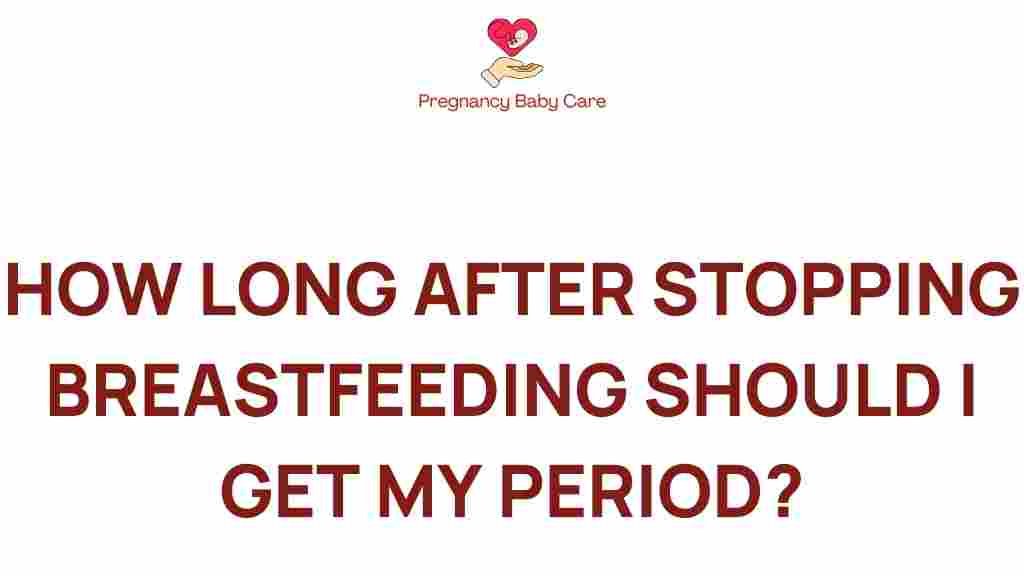The Timeline of Menstruation: When to Expect Your Period After Breastfeeding
Understanding the timeline of menstruation after breastfeeding is crucial for new mothers navigating postpartum recovery and fertility. The relationship between breastfeeding and menstruation is complex and influenced by various hormonal changes that occur in a woman’s body after childbirth. This article will provide an in-depth look at what to expect regarding your menstrual cycle, including when ovulation typically resumes, and offer insights into women’s health during this transitional period.
Understanding the Menstrual Cycle Postpartum
The menstrual cycle is regulated by hormones such as estrogen and progesterone, which fluctuate throughout the cycle. After giving birth, women experience significant hormonal changes that affect menstruation. Breastfeeding can have a profound impact on the timing of the return of your period.
During the initial postpartum phase, the body is focused on recovery from childbirth and establishing breastfeeding. Prolactin, the hormone responsible for milk production, inhibits the function of the ovaries, often leading to an absence of menstruation. This phenomenon is known as lactational amenorrhea.
Factors Influencing the Return of Menstruation
A variety of factors can influence when you might expect your period to return after breastfeeding:
- Duration of Breastfeeding: Women who exclusively breastfeed may not see their periods return for several months, while those who introduce formula or solids may notice a quicker return.
- Frequency of Breastfeeding: More frequent breastfeeding sessions can prolong the absence of menstruation due to higher prolactin levels.
- Individual Hormonal Levels: Each woman’s hormonal balance is unique, which can affect the timing of ovulation and menstruation.
- Overall Health and Stress Levels: Physical and emotional stress can impact hormone levels and delay the return of menstruation.
Typical Timeline After Childbirth
Every woman’s experience is different, but here is a general timeline of what to expect after childbirth regarding menstruation and breastfeeding:
- 0-3 Months Postpartum: Many women do not have a period during this time, especially if exclusively breastfeeding.
- 3-6 Months Postpartum: Some may start to see their periods return, particularly if they supplement with formula or reduce breastfeeding frequency.
- 6-12 Months Postpartum: For those who breastfeed less frequently or wean, menstruation may return. Women who exclusively breastfeed may still experience lactational amenorrhea.
- 12+ Months Postpartum: Most women will have resumed their menstrual cycles by this time unless they are still breastfeeding frequently.
Hormonal Changes and Ovulation
Understanding the hormonal changes that occur postpartum is vital for recognizing your fertility status:
- Prolactin: This hormone is elevated during breastfeeding and suppresses ovulation. As breastfeeding frequency decreases, prolactin levels drop, allowing the ovaries to resume function.
- Estrogen and Progesterone: The return of these hormones indicates that your cycle is beginning to normalize. Ovulation typically occurs about two weeks before menstruation starts.
- Tracking Ovulation: If you are trying to conceive, tracking ovulation signs such as changes in cervical mucus or using ovulation predictor kits can help.
Signs That Your Period is About to Return
As your body transitions back to a regular cycle, several signs may indicate that your period is approaching:
- Changes in breast tenderness or fullness
- Increased mood swings or emotional fluctuations
- Changes in appetite or cravings
- Cramping or bloating akin to premenstrual symptoms
Troubleshooting Common Concerns
As you navigate postpartum recovery and the return of your menstrual cycle, you may encounter some common concerns:
- Irregular Periods: It is normal to experience irregular cycles after childbirth, especially during the first few months. Your cycle will likely stabilize over time.
- Heavy Menstrual Flow: Some women may notice heavier periods initially. If this continues or causes concern, consult a healthcare provider.
- Painful Periods: If you experience significant discomfort, it may be worth discussing with a healthcare professional, as hormonal changes can influence pain levels.
Impact on Fertility
Understanding the relationship between breastfeeding and fertility is essential for women considering future pregnancies:
- Breastfeeding can delay the return of fertility, but it is not a foolproof method of contraception.
- Ovulation can occur before your first postpartum period, meaning it is possible to conceive even if you haven’t had your period yet.
- If you are not ready for another pregnancy, consider discussing contraceptive options with your healthcare provider.
Conclusion
In summary, the timeline of menstruation after breastfeeding can vary significantly among women. Factors such as the duration and frequency of breastfeeding, individual hormonal responses, and overall health play crucial roles in when your period will return. Understanding these changes can help you better navigate your postpartum recovery and fertility.
For more information on women’s health and fertility, consider visiting this resource to explore further insights. Remember, if you have specific concerns about your menstrual cycle or reproductive health, consulting with a healthcare professional is always advisable. Your health and well-being are paramount during this transformative time.
Stay informed and empowered as you transition through motherhood; your body is uniquely designed to adapt and thrive.
This article is in the category Health and created by PregnancyBabyCare Team
